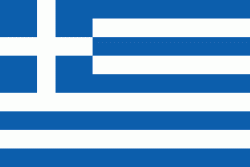Lesbos
According to later Greek writers, Mytilene was founded in the 11th century BC by the family Penthilidae, who arrived from Thessaly and ruled the city-state until a popular revolt (590–580 BC) led by Pittacus of Mytilene ended their rule. In fact, the archaeological and linguistic record may indicate a late Iron Age arrival of Greek settlers although references in Late Bronze Age Hittite archives indicate a likely Greek presence then. The name Mytilene itself seems to be of Hittite origin. According to Homer's Iliad, Lesbos was part of the kingdom of Priam, which was based in Anatolia. Much work remains to be done to determine just what happened and when. In the Middle Ages, it was under Byzantine and then Genoese rule. Lesbos was conquered by the Ottoman Empire in 1462. The Ottomans then ruled the island until the First Balkan War in 1912, when it became part of the Kingdom of Greece.
The island is widely known as the home of the ancient Greek poet Sappho, from whose association with homosexuality the word lesbian derives its modern meaning. It is also sometimes called the "Island of the Poets".
The name is from Ancient Greek (Lésbos, 'forested, woody'), possibly a Hittite borrowing, as the original Hittite name for the island was Lazpa. An older name for the island that was maintained in Aeolic Greek was Ἴσσα (Íssa).
The traditional English form Lesbos (pronounced, also ) comes from Ancient Greek. In Modern Greek, letter β is pronounced and transliterated as v, producing the alternative form Lesvos. In Greece, it is often referred to as Mytilene (Μυτιλήνη), after its capital.
Map - Lesbos
Map
Country - Greece
 |
 |
| Flag of Greece | |
Greece is considered the cradle of Western civilization, being the birthplace of democracy, Western philosophy, Western literature, historiography, political science, major scientific and mathematical principles, theatre and the Olympic Games. From the eighth century BC, the Greeks were organised into various independent city-states, known as poleis (singular polis), which spanned the Mediterranean and the Black Sea. Philip II of Macedon united most of present-day Greece in the fourth century BC, with his son Alexander the Great rapidly conquering much of the ancient world, from the eastern Mediterranean to the North Western parts of India. The subsequent Hellenistic period saw the height of Greek culture and influence in antiquity. Greece was annexed by Rome in the second century BC, becoming an integral part of the Roman Empire and its continuation, the Byzantine Empire, which was culturally and linguistically predominantly Greek.
Currency / Language
| ISO | Currency | Symbol | Significant figures |
|---|---|---|---|
| EUR | Euro | € | 2 |
| ISO | Language |
|---|---|
| EN | English language |
| FR | French language |
| EL | Greek language |















